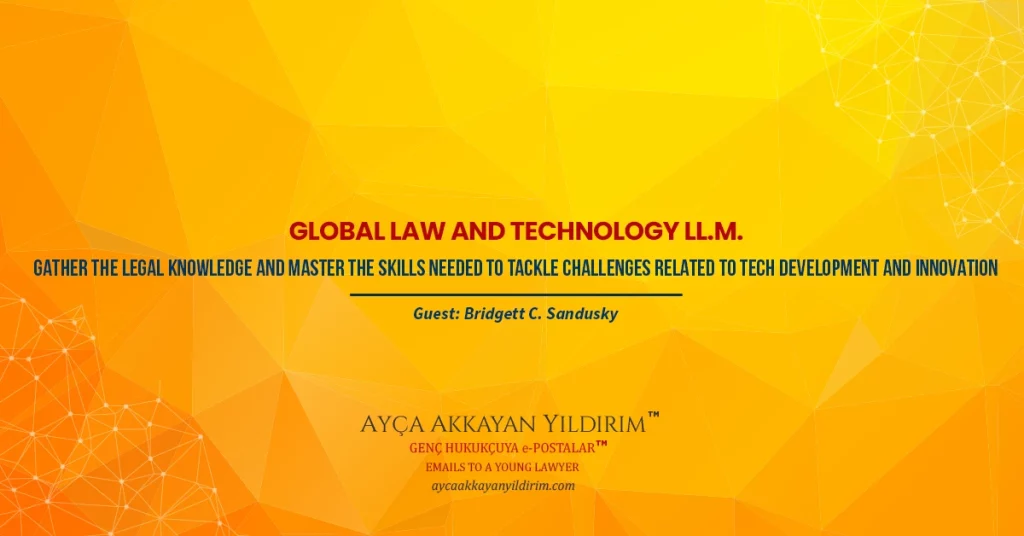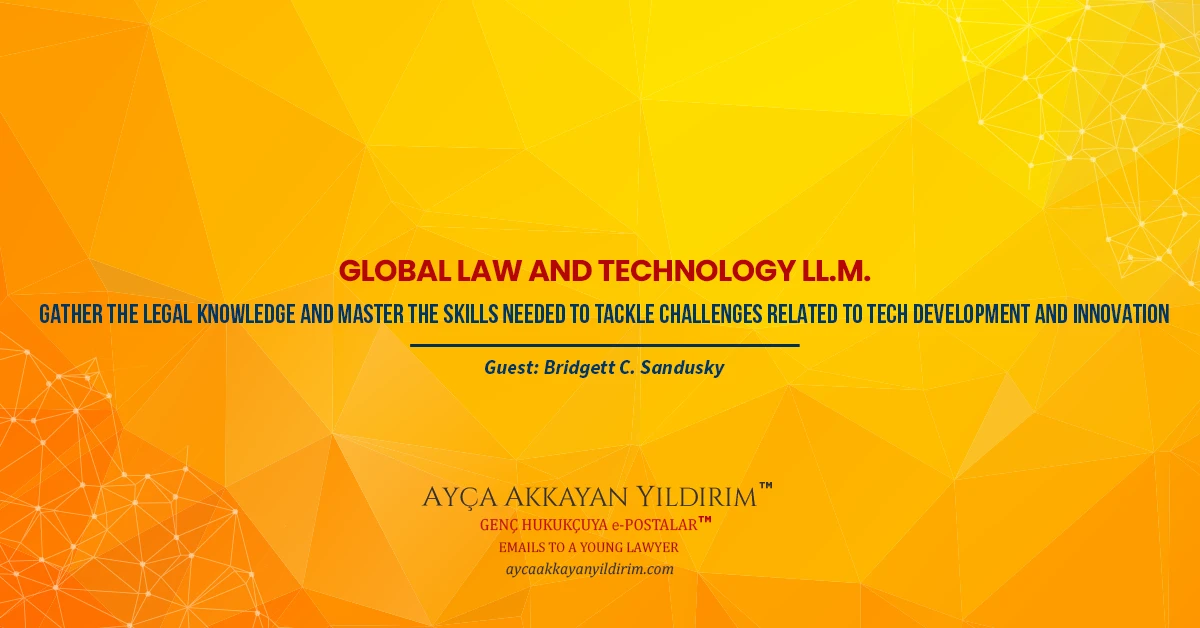Tuesday, November 7, 2023


Date : November 7, 2023
To : Young Lawyers
Re : GLOBAL LAW AND TECHNOLOGY LL.M.: GATHER THE LEGAL KNOWLEDGE AND MASTER THE SKILLS NEEDED TO TACKLE CHALLENGES RELATED TO TECH DEVELOPMENT AND INNOVATION
INTERNATIONAL LL.M. PROGRAMS: SUFFOLK UNIVERSITY LAW SCHOOL, BOSTON, MA, USA
I sincerely thank Bridgett C. Sandusky, Assistant Dean of Graduate Law Programs, for answering my questions. It is always a pleasure to collaborate with her. AAY
AAY: I am pleased to host you for the second time on this project, Bridgett; welcome back to Emails to A Young Lawyer! You’ve always been very resourceful, and I truly appreciate your help and guidance to countless international students whose path crosses with you. This interview will focus on Suffolk Law’s Global Law and Technology LL.M. Program. Please let our readers know when and for what purpose this program was designed.
BS: Thank you for the opportunity to share more about Suffolk University Law School’s LL.M. in Global Law and Technology degree. Breakthroughs in science, technology, and communication have resulted in legal challenges never before faced–challenges of global proportions for tomorrow’s leaders. Suffolk Law’s LL.M. in Global Law and Technology will help graduates meet these challenges and prepare for the future practice of law.
Created in 2002, Suffolk’s Global Law and Technology program was the first of its kind in the United States: an LL.M. combining different specializations into one program.
AAY: Suffolk’s Global Law and Technology program combines different specializations into one program, considering the current legal challenges created by scientific, technological, and communication breakthroughs. Please elaborate on the structure of the program. How many specializations does Global Law and Technology LL.M. offer?
BS: Students can choose to specialize in one of the four areas below or select from a wide range of courses to design their own professional program. The first three specializations are earned by completing a minimum of five designated courses in that subject matter. The U.S. Law and Legal Methods specialization is earned by completing 12 credits of basic U.S. law courses.
- Intellectual Property and Information Technology Law
- Biotechnology and Health Law
- International Law and Business
- U.S. Law and Legal Methods
AAY: Is earning more than one Global Law and Technology LL.M. specialization possible? How does this work?
BS: Yes, students may earn up to two specializations with careful planning. I am the designated academic advisor for our LL.M. students, so they receive a lot of guidance about course selection and personal attention. We discuss which courses will best help them fulfill their future career goals. Some of the courses may count toward two specialization areas. For example, International Intellectual Property Law would count toward the International Law and Business specialization and the Intellectual Property and Information Technology specialization.
AAY: I believe specializations should be chosen based on the prospective LL.M. student’s area of interest and their capability to excel in that area. Please share your perspective on this. What concentrations do most Global Law and Technology LL.M. students choose?
BS: I absolutely agree with you. Students often ask me what specialization is the best one for them to choose. I tell them that the best one for them is the one that they are most interested in. The most popular specializations are Intellectual Property and Information Technology and International Law and Business. I’m always surprised that the Biotechnology and Health specialization is not of more interest to students, given Boston’s recognized status as the global hub of the life sciences industry.
AAY: Could you please share the degree details? How many credit hours are required to complete the program? Can LL.M. students take courses from the JD curriculum?
BS: The degree is 24 credits in total. Students who completed their law degree outside of the United States are required to take “U.S. and Legal Reasoning” and “Legal Writing for Graduate Law Students” during their LL.M. degree. These two courses are limited to LL.M., exchange students, and MS in Law: Life Sciences (MSLL) students. The remaining 20 credits are chosen by the student based on their intended specialization. All of the other courses that an LL.M. student will take will be open to J.D., MSLL, SJD, and exchange students. Suffolk LL.M. students will often enroll in experiential-based or simulation-based courses, such as “Negotiation for Lawyers” or “Drafting Contracts”. These types of courses are limited enrollment courses with only 12-18 students to ensure that each student is able to both learn the theory but also that they will have the opportunity to practice and ultimately master the skill.
AAY: Specialization is a considerable commitment. So, I wonder if Global Law and Technology LL.M. students can also take courses routinely covered on bar exams to be eligible to sit for a bar exam and seek admission to practice in the US.
BS: Yes, they may absolutely take bar-tested courses to gain eligibility to take a bar exam in the United States. The specialization in U.S. and Legal Methods is offered for exactly that reason. Depending on the student’s intended specialization, they may need to take a few extra credits.
AAY: Getting advice about curriculum, career planning, research, etc., from law school staff and faculty is essential for LL.M.s. Please outline the individualized academic support services offered to Global Law and Technology LL.M. students at Suffolk Law.
BS: Before new LL.M. students arrive in Boston, they will have an individual advising session with me. In this meeting, we plan for the entire academic year to ensure that the student will be able to meet all of their personal and professional goals within the designated timeframe. Once students arrive in Boston, we have a mandatory orientation program, which is held the week before classes begin. During this program, students will meet a variety of faculty and staff, who will be critical for their success at Suffolk Law.
In our Office of Professional and Career Development, LL.M. students meet with one of two designated LL.M. career advisors, who will review resumes and cover letters and will teach students how to network and offer networking events. If students are not great at interviewing, the office provides mock interviews for our LL.M. students. All students receive targeted job search strategies and access to the best legal job search databases. Lastly, each student receives free membership to the Massachusetts Bar Association and the Boston Bar Association to promote active networking outside of the law school.
The Office of Academic Support provides a free, non-credit course called Academic Excellence. This course offers modules on how to outline, exam-taking techniques for essay exams vs. multiple-choice exams, thinking and reading like a lawyer, and the best way to take notes in law school.
Lastly, I would be remiss if I did not mention the outstanding faculty members at Suffolk Law. Renowned scholars in their fields first and foremost view themselves as teachers. They are really special and go out of their way to make sure that LL.M. students feel welcomed and supported in their courses. Every year, LL.M. students tell me about faculty members who helped them succeed in big and small ways by caring about their academic studies and personal well-being.
AAY: Opportunities that allow law students to apply their theoretical and doctrinal knowledge to real-world issues in an applied setting are invaluable. How does Suffolk Law assist Global Law and Technology LL.M. students in finding internships during and/or after the program? Can LL.M. students participate in other non-classroom activities and clinics at the same level as JD students?
BS: With over 40 active student law groups and associations, students are able to find students with similar interests and actively engage with alumni who practice in the same field. The Office of Professional Career Development is critical in helping our LL.M. students find internships. LL.M. students in the LL.M. in Global Law and Technology are required to participate in an internship unless waived, and so this means that these students can participate in Curricular Practical Training (CPT). CPT allows F1 visa-holding students the eligibility to have an internship off-campus in a legally related position in the 2nd semester of their LL.M. degree. LL.M. students at Suffolk Law also have access to Optional Practical Training after they complete their LL.M. degree, which allows them to stay in the United States for up to 12 months after they complete their degree.
Suffolk Law’s clinics are lottery-based, and they require a one-year commitment, and course prerequisites must be completed before the clinic begins. In addition, students earn 10 credits in most clinics, which, coupled with prerequisites, would be more than half of the total number of credits in the LL.M. degree. Therefore, for those reasons and since Suffolk LL.M. students have access to CPT, we do not allow them to participate in the clinics.
Our location in downtown Boston allows our students easy access to internships in the city and to take advantage of networking events throughout the city. The Boston Bar Association is a quick five-minute walk from campus. In addition, our location allows us to bring in adjunct faculty, who are sitting judges, senior partners in law firms, and experts in specialized areas of the law. This is yet another avenue for our students to deepen their networks. Over the years, a number of LL.M. students have secured internships with our adjunct faculty and full-time faculty or through direct introductions to their internship host.
Lastly, LL.M. students are eligible to be faculty research assistants, and I have even had LL.M. students co-author publications with faculty, too.
AAY: Let’s touch upon another issue LL.M. candidates are most curious about. Is financial aid available to Global Law and Technology LL.M. students at Suffolk Law?
BS: Every applicant is automatically reviewed for merit-based scholarship potential. Applicants do not need to submit any special forms for consideration. The Scholarship Committee looks at many factors, not only a student’s grades but also English language test scores, work experience, and other special awards and honors. At Suffolk Law, we understand that U.S. legal education is expensive, so we try our best to help support our internationally admitted students. Most admitted students receive some level of funding. The largest scholarship award that we offer is a 50% tuition scholarship.
AAY: I was excited to hear about your upcoming visit to Istanbul in late November 2023. Please share the details of this excellent opportunity for prospective LL.M. students to meet with you in person and learn more about all of the LL.M. programs offered by Suffolk Law.
BS: I am excited about my upcoming visit to Istanbul too! I was slated to participate in the EducationUSA LL.M. Fair on Thursday, November 16, in Istanbul, but unfortunately, the fair was just canceled.
However, the good news is that I am very happy to schedule 1:1 or group meetings with interested students. Interested students may email me at llm@suffolk.edu to book a meeting. I will be in Istanbul from 16 to 20 November.
Thank you again for the opportunity to share more about Suffolk Law and the LL.M. in Global Law and Technology.
